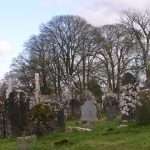A happy corpse
“Happy is the corpse the rain falls on”, said the man standing at the gateway. Drops of water ran down his face as he stared up the road in anticipation of the funeral’s arrival.
It is said that Molua founded a church on the site in the 6th Century; stones testify to a medieval presence. Perhaps burials have taken place for a thousand years or more, the graves visible are much more recent, though. This was famine country, the workhouse that served these scattered communities is no more than a few miles away. If such obsequies could have been afforded, it would not have been difficult to have imagined a cortege coming from the village in the days of the hunger; men dressed in the only good shirt and trousers they possessed, women in their only frock; bare-footed children bewildered by all that was happening. The cheap wood coffin being carried on the shoulders of brothers or sons or friends. More likely, the burial would have been witnessed by no more than a handful of people, or maybe a single mourner, who would also have dug the grave. How many thousands of tears has this road seen? How many tragic tales have ended in this place?
A dozen or so years ago, the cemetery was restored, through the efforts of volunteers. Generations of weeds and briars were cut away; fallen headstones placed upright. The restoration of the cemetery must have done much to reveal the sadness it had seen, simple lumps of stone mark the many graves where families had been too poor to afford a headstone, or memorial of any sort. The plain stones are mute, unable to tell any tale of who had been laid to rest below; no name, no place, no date to share with those who might come across the Atlantic searching.
The Slieve Blooms were invisible, their place filled by greyness, and the rain was relentless. The hearse arrived and we silently trod our way to the open grave. The current custom of gravediggers to surround graves, and cover excavated soil, with green artificial grass seems intended to take some of the harshness from the mood of the moment, as if it could be made more palatable, more pleasant. The necessary prayers were said and the gathering gradually dispersed; soup and sandwiches awaited.
In the midst of it all, there seemed not a moment for personal thoughts. He had been a good man, in the truest, and fullest, and best sense of the word “good”. He had talked often of this moment, “I’ll be going up the road to Kyle”, but he no more believed that he would be making that journey than I believe we buried him. Passing the road this afternoon, there was an inclination to call at the cemetery, but he would have said, “Sure, what was the point of all that preaching if you think I am there?”
May he enjoy his happiness.


Comments
A happy corpse — No Comments
HTML tags allowed in your comment: <a href="" title=""> <abbr title=""> <acronym title=""> <b> <blockquote cite=""> <cite> <code> <del datetime=""> <em> <i> <q cite=""> <s> <strike> <strong>